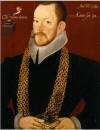
Richard CAREW
Born: 17 Jul 1555, Anthony, Cornwall, England
Died: 6 Nov 1620
Buried: 7 Nov 1620, East Anthony, Cornwall, England
Father: Thomas CAREW of Antony
Mother: Elizabeth EDGECUMBE
Married: Juliana ARUNDELL ABT 1579
Children:
1. Richard CAREW of Antony (Sir)
4. Hobye CAREW
5. Anne CAREW
6. George CAREW
7. Wymond CAREW (b. 1604)
Richard Carew as High-Sherrif and Deputy-Lieutenant of Cornwall
Poet and antiquary, is the best-known member of one of the leading families of Cornwall. His father, Thomas Carew of Antony House, in the parish of East Anthony, married Elizabeth, daughter of Sir Richard Edgecumbe, and their eldest son, Richard, was born at Anthony House on 17 Jul 1555. When only eleven years old he became a gentleman commoner of Christ Church, Oxford, but his rooms were in Broadgate Hall, and he was probably one of the two persons called Carew appearing in a list of the undergraduates resident in that hall about 1570. Here, when a scholar of three years' standing, he was called upon, as he modestly says, 'upon a wrong conceived opinion touching my sufficiency', to dispute 'extempore' (impar congressus Achilli) with the matchless Sir Phillip Sidney, in presence of the Robert Dudley, Earl of Leicester; Ambrose Dudley, Earl of Warwick, and 'divers other great personages'. What the issue of the contest was Carew has omitted to state, but later historians have added that the dispute resulted in a drawn battle. The family estates passed to him early in life, and in the verses on his ancestors and his issue which he incorporated in his 'Survey of Cornwall' (pp. 246-7, ed. 1811) it is recorded that he was the fifth of his race to inherit the patrimony. In 1577 he married Juliana, the eldest daughter of John Arundell of Trerice, by his first wife, Catherine, daughter of John Coswarth, and through his marriage he inherited a part of the Coswarth property.
In 1581 he was appointed a justice of the peace, and in 1586 he was called upon to act as high sheriff of Cornwall. As he was the owner of large estates near several Cornish boroughs, and his connections embraced the principal gentry of the county, he had little difficulty in obtaining a seat in parliament. In 1584 he was returned for Saltash, and in 1597 he sat for St. Michael's. He was one of the deputy-lieutenants of Cornwall, and he served under Sir Walter Raleigh, the lord-lieutenant of the county, in the posts of treasurer of the lieutenancy and colonel of the regiment, five hundred strong, which had for its charge the protection of Cawsand Bay. Of the Society of Antiquaries first established by Archibishop Parker, Carew became an active member in 1589, and about the same time began the task of compiling an historical survey of his native county. Among the gentry of Cornwall he took the first place, and the antiquaries of London accepted him as their equal. Spelman, who addressed to him an 'Epistle on Tithes', and Camden were his intimate friends, and in Ben Jonson's 'Execration upon Vulcan' he is classed with Cotton and Selden.
In 1594 there appeared a rendering of 'Examen de Ingenios. The examination of men's wits' by John Huarte. Translated out of the Spanish Tongue by M. Camillo Camilli. Englished out of his Italian by 'R. C[arew], Esquire', which was reprinted in 1596, 1604, and 1616. Huarte's work is a dull treatise of little value, on the corporeal and mental qualities of men and women. Carew's translation is dedicated to Sir Francis Godolphin, who lent him Camilli's version, a loan recorded in the words, 'Good Sir, your booke returneth vnto you clad in a Cornish gabardine'.
He died on 6 Nov 1620, 'as he was at his private prayers in his study (his daily practice) at fower in the afternoon', and was buried in Anthony Church.
 to Bios
Page
to Bios
Page |
|
 to Peerage Page
to Peerage Page |
 to Home Page
to Home Page |